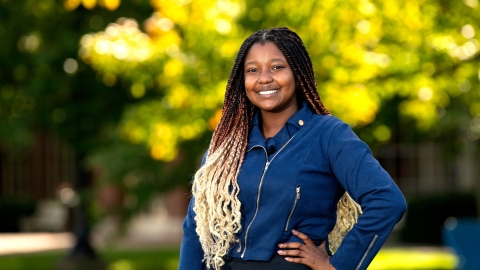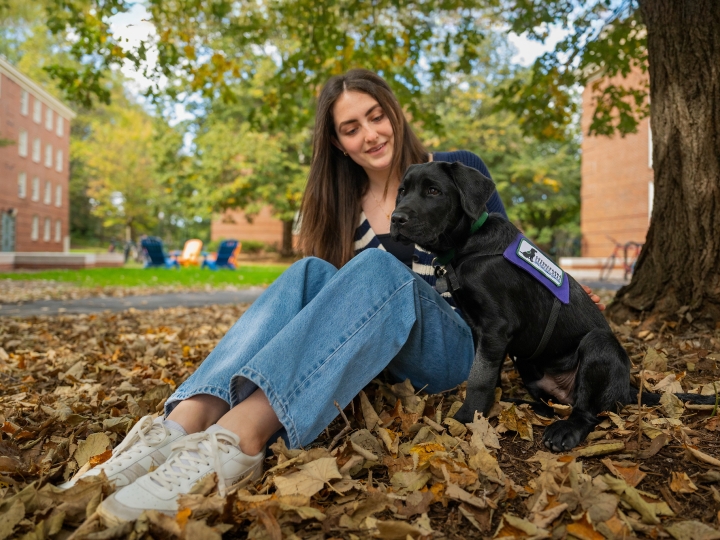
Twity Gitonga '24, Computer Science & Engineering
June 5, 2023
Twity Gitonga '24 has found community and a sense of home in Lewisburg. Photo by Emily Paine, Communications
Twity Gitonga '24 was more than an ocean away in her hometown of Nairobi, Kenya, when she decided to attend Bucknell. Originally enrolled at a Kenyan university, she wasn't satisfied with its academics and began applying to colleges in the United States. Gitonga wanted a change — a challenge — and Bucknell offered her a financial aid package that could make that happen. She was named a Fremont Scholar, a prestigious award given to international students.
Unfortunately, her U.S. embassy was closed during the pandemic, which meant Gitonga wouldn't receive her visa in time. She spent her first semester, Fall 2020, as an online student, logging into classes at 2 a.m. Eastern Africa Time. She embraced assignments, like theorizing solutions for water contamination problems in Flint, Mich., during her Exploring Engineering lecture. She also engaged with fellow Bucknellians and was thrilled when her physics professor, Sally Koutsoliotas, set up "Zoom buddies" so peers could FaceTime Gitonga and "walk" her to class.
The following semester, she traveled 7,500 miles to central Pennsylvania. Because of the digital connection she had made, things felt familiar — except for the snow. ("I had never been that cold before," she recalls, adding that a staff member from international student services kindly offered her a winter coat.) She felt welcomed, again, when she finally met her professors and friends. Soon, Gitonga was making connections within the Lewisburg community. She joined a local church; found someone with whom she can speak Swahili and cook Kenyan food like chapati flatbread; and grew close with a local family, who invited Gitonga and her Bucknell friends to join them for meals and to ride horses.
On campus, Gitonga delved into computer science & engineering studies and research. First, she worked with Fulbright Scholar Diane Jakacki in digital humanities to retranscribe Records of Early English Drama, a collaborative scholarly project to study a period of historical theatre performance. "As a computer scientist, it was so eye-opening," she says. "There was a lot of machine learning and data behind everything, but there was also social justice, like the roles of women." Her next project, in Fall 2021, explored the design of artificial intelligence systems in the context of Blackness. In other words, what are the ethics behind natural language processing in a computer? And, if there is bias, how can it be unlearned? Gitonga attributes these well-rounded educational experiences to Bucknell’s emphasis on liberal arts. "If I was in another school, I don't think they would ask, 'Have you considered the humanity side?' "
Last spring, she was tapped by Erica Delsandro, assistant professor of women's and gender studies, as a research assistant on a project studying sexual assault in universities. Using data collected over the course of more than 20 years by Professor Bill Flack, psychology, Gitonga created a new 3D ecological model of insights learned from the data. But being able to visualize information isn't enough — Gitonga recognizes and accounts for the sensitivity of the subject matter. "I have an opportunity to make people's voices be heard," she says. "I don't want them to be another statistic." Ultimately, what she presents will serve as a future framework for students, the community and school administration on how to provide sufficient resources and improve overall safety on campus.
As an international, Black female student in engineering, Gitonga understands the importance of representation. "Being African is different from being African American," she says. With the help of Prof. Delsandro, Gitonga and another student co-founded Bucknell Advocates for Diversity. "It's a place to belong and to be understood," says Gitonga. The group hosted its first student-led diversity panel in September with a simple goal: improve the college experience for others on campus. She's also a member of the Bucknell African Student Association and an ambassador for the Bucknell Global Community, which offers a safe and inclusive space to celebrate culture and diversity.
After graduation, Gitonga wants to explore ethical justice in technologies and incorporate diversity and inclusion in the tech spaces. Being skilled at coding and programming, Gitonga says she might work in Big Tech before possibly launching her own startup. It wouldn't be her first entrepreneurial endeavor: Several years ago, she and her friends pitched a new financial management system for their high school in Kenya. The previous method required money to be controlled and distributed by someone like a resident adviser and was often inefficient and unreliable. The idea, which their school eventually adopted, now allows students to manage their own money.
Gitonga's desire is to use her computer science skills to improve society and solve problems. "I want to think of something and just run with it," she says. "And, by coming to the United States, I actually have that opportunity."

